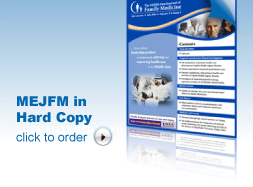|
|
 |
| ............................................................. |
|
|
| ........................................................ |
| From
the Editor |

|
Editorial
A. Abyad (Chief Editor)
DOI:10.5742/MEWFM.2019.93610
|
........................................................
|
|
Editorial
Dr.
Abdulrazak Abyad
DOI: 10.5742/MEWFM.2019.93623
Original Contribution
Self-monitoring
of Blood Glucose Among Type-2 Diabetic Patients:
An Analytical Cross-Sectional Study
[pdf]
Ahmed S. Alzahrani, Rishi K. Bharti, Hassan
M. Al-musa, Shweta Chaudhary
DOI: 10.5742/MEWFM.2019.93624
White
coat hypertension may actually be an acute phase
reactant in the body
[pdf]
Mehmet Rami Helvaci, Orhan Ayyildiz, Orhan Ekrem
Muftuoglu, Mehmet Gundogdu, Abdulrazak Abyad,
Lesley Pocock
DOI: 10.5742/MEWFM.2019.93625
Case Report
An
Unusual Persistent Mullerian Duct Syndrome in
a child in Abha city: A Case Report
[pdf]
Youssef Ali Mohamad Alqahtani, Abdulrazak Tamim
Abdulrazak, Hessa Gilban, Rasha Mirdad, Ashwaq
Y. Asiri, Rishi Kumar Bharti, Shweta Chaudhary
DOI: 10.5742/MEWFM.2019.93628
Population and Community
Studies
Prevalence
of abdominal obesity and its associated comorbid
condition in adult Yemeni people of Sana’a
City
[pdf]
Mohammed Ahmed Bamashmos
DOI: 10.5742/MEWFM.2019.93626
Smoking
may even cause irritable bowel syndrome
[pdf]
Mehmet Rami Helvaci, Guner Dede, Yasin Yildirim,
Semih Salaz, Abdulrazak Abyad, Lesley Pocock
DOI: 10.5742/MEWFM.2019.93629
Systematic
literature review on early onset dementia
[pdf]
Wendy Eskine
DOI: 10.5742/MEWFM.2019.93627
|
|
Chief
Editor -
Abdulrazak
Abyad
MD, MPH, MBA, AGSF, AFCHSE
.........................................................
Editorial
Office -
Abyad Medical Center & Middle East Longevity
Institute
Azmi Street, Abdo Center,
PO BOX 618
Tripoli, Lebanon
Phone: (961) 6-443684
Fax: (961) 6-443685
Email:
aabyad@cyberia.net.lb
.........................................................
Publisher
-
Lesley
Pocock
medi+WORLD International
AUSTRALIA
Email:
lesleypocock@mediworld.com.au
.........................................................
Editorial
Enquiries -
abyad@cyberia.net.lb
.........................................................
Advertising
Enquiries -
lesleypocock@mediworld.com.au
.........................................................
While all
efforts have been made to ensure the accuracy
of the information in this journal, opinions
expressed are those of the authors and do not
necessarily reflect the views of The Publishers,
Editor or the Editorial Board. The publishers,
Editor and Editorial Board cannot be held responsible
for errors or any consequences arising from
the use of information contained in this journal;
or the views and opinions expressed. Publication
of any advertisements does not constitute any
endorsement by the Publishers and Editors of
the product advertised.
The contents
of this journal are copyright. Apart from any
fair dealing for purposes of private study,
research, criticism or review, as permitted
under the Australian Copyright Act, no part
of this program may be reproduced without the
permission of the publisher.
|
|
|
| March 2019 - Volume
17, Issue 3 |
|
|
Self-monitoring of Blood Glucose
Among Type-2 Diabetic Patients: An Analytical
Cross-Sectional Study
Ahmed S. Alzahrani
(1)
Rishi K. Bharti (2)
Hassan M. Al-musa (3)
Shweta Chaudhary (4)
(1) Family Medicine specialist, Community medicine
resident, Abha, King Khalid University Saudi
Arabia
(2) Assistant Professor, Community medicine
consultant, Faculty of Medicine, King Khalid
University,
Saudi Arabia.
(3) Associate Professor, Family Medicine consultant,
Family and Community medicine department,
Faculty of medicine, King Khalid University,
Saudi Arabia.
(4) Assistant Professor, Department of Anatomy,
Faculty of Medicine, King Khalid University,
Saudi Arabia.
Corresponding
author:
Dr. Ahmed
Salem Al-zahrani,
Family Medicine specialist, Community Medicine
resident
Abha, King Khalid University, Saudi Arabia
Email : ahmedalzahrani122333@gmail.com

|
Abstract
Background: Diabetes mellitus (DM)
is a public health disease needing urgent
consideration; it has a great impact on
human life in addition to being costly
to manage. According to the current recommendations,
self-monitoring of blood glucose (SMBG)
is important in order to achieve and maintain
glycemic control, prevent and identify
hypoglycemia, prevent severe hyperglycemia
and support lifestyle changes.
Methods: The objective of this
study is to explore the effect of using
SMBG on glycemic control among type 2
diabetic patients attending the primary
health care centers in Abha city in the
Kingdom of Saudi Arabia, by comparing
those who are monitoring themselves and
others who are not. The study design was
analytical cross-sectional and conducted
through an interviewing questionnaire.
Results: The age of participants
was 30-82 years old, with a mean age distribution
of 57.4 years old. The percentages of
groups doing and not doing SMBG were 43%
and 57% respectively. Chi square tests
show that the relationship between glycemic
control and SMBG is statistically significant
according to frequency and time of doing
SMBG, since almost all of the results
for the participants who do SMBG are above
the target for glycemic control (>=7%).
The relationship between glycemic control
and compliance according to SMBG shows
there is a statistically significant relationship
with appointment compliance among the
group doing SMBG, and with drug compliance
among the other group.
In both groups, almost all the participants
were above the target for control (>=7%),
which means that there is no relationship
between doing SMBG and better glycemic
control.
Conclusion:
There is not sufficient evidence to
show that the self-monitoring of blood
glucose is associated with an improvement
in glycemic control among type 2 diabetics
and it is shown that glycemic control
for both groups that are using and not
using SMBG is above the target. It is
recommended that more well conducted randomized
controlled trials should be undertaken
to evaluate the relationship between SMBG
and glycemic control in type 2 diabetes,
at the same time the current guidelines
for the use of SMBG among patients with
well controlled non-insulin treated type
2 diabetes need to be reviewed.
Key words: Self-monitoring, blood
glucose (SMBG), glycemic control, type
2 diabetes, comorbidities.
|
|
|
.................................................................................................................

|
| |
 |

